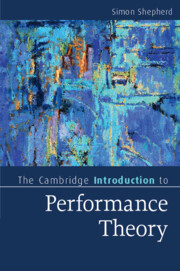Book contents
- Frontmatter
- Contents
- Preface
- Part I Definitions of performance
- 1 Sociology and the rituals of interaction
- 2 Theatre, ceremony and everyday life
- 3 Ethnography, folklore and communicative events
- 4 Cultural performance, social drama and liminality
- 5 Performance as a new sort of knowledge
- Part II The emergence of performance as sensuous practice
- Part III Theorising performance
- Closing note
- References
- Index
- Cambridge Introductions to …
5 - Performance as a new sort of knowledge
from Part I - Definitions of performance
Published online by Cambridge University Press: 05 February 2016
- Frontmatter
- Contents
- Preface
- Part I Definitions of performance
- 1 Sociology and the rituals of interaction
- 2 Theatre, ceremony and everyday life
- 3 Ethnography, folklore and communicative events
- 4 Cultural performance, social drama and liminality
- 5 Performance as a new sort of knowledge
- Part II The emergence of performance as sensuous practice
- Part III Theorising performance
- Closing note
- References
- Index
- Cambridge Introductions to …
Summary
Goffman's ‘dramaturgical’ analysis, the readings of social rituals done by the Centre for Contemporary Cultural Studies and the understanding of role and convention established by theatre sociology all seek to establish information about particular sorts of human interactions. In a similar way Singer's and Turner's models claim to establish information about how societies work, as whole societies. What they all have in common is that they are producing this information by treating their objects of investigation as forms of performance. This information is very different from the largely statistical, and measurable, data that were previously gathered in order to understand social processes. An approach which frames and analyses its objects of study as performance thus seems to give access to new sorts of knowledge.
For example, it could bring about a change of emphasis from ‘systems of representation’ to ‘processes of practice and performance’, from texts to actions, from ‘symbol structures’ to ‘physical habitus’. This is how two cultural geographers, Dirksmeier and Helbrecht, describe the impact on their discipline from viewing life ‘as a performance’. For them this new way of looking and thinking offered an alternative to ‘a growing discontent within the traditional social sciences and their understanding of practices as texts or representations of genuinely symbolic concepts’ (2008: 4). Cultural geographers had become aware that a focus simply on representation could not give access to that which was not representable, leading to the development of so-called non-representational theory. In his overview of this ‘theory’, Lorimer notes that a range of different positions concur by insisting on ‘expanding our once comfortable understanding of “the social” and how it can be regarded as something researchable’, where the research is interested in ‘how life takes shape and gains expression in shared experiences, everyday routines, fleeting encounters, embodied movements, precognitive triggers, practical skills, affective intensities, enduring urges, unexceptional interactions and sensuous dispositions’. He then focuses on research into gardens, homes and work (Lorimer 2005: 84).
The single mechanism which facilitated this change of interest was the notion of ‘performance’. In 2000 a special issue of Environment and Planning D was devoted to this notion ‘whose hold is becoming general across much of the social sciences and humanities’, from architecture to history of science.
- Type
- Chapter
- Information
- The Cambridge Introduction to Performance Theory , pp. 47 - 54Publisher: Cambridge University PressPrint publication year: 2016



